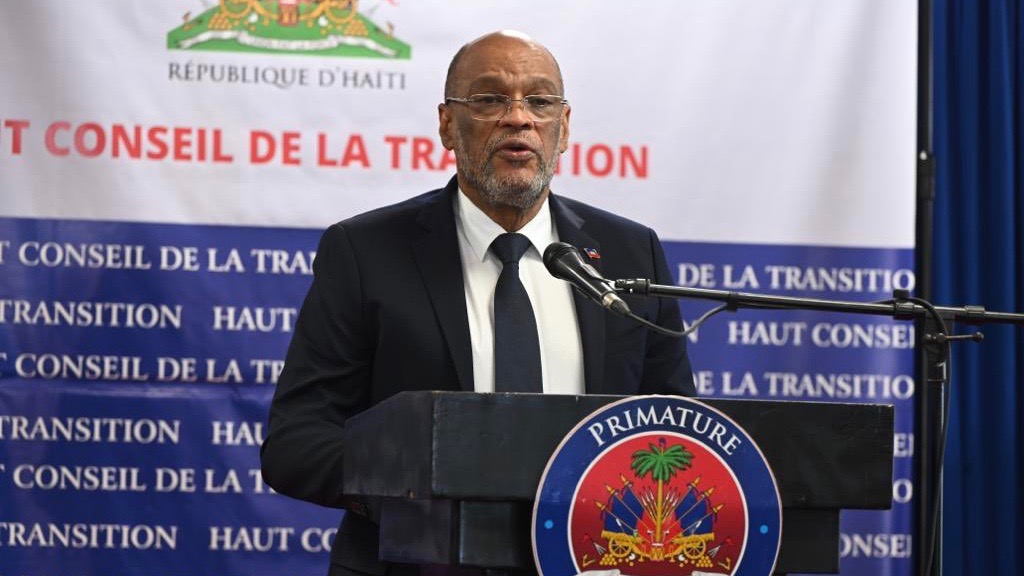On Monday, February 6, Haiti’s de facto government led by Ariel Henry formally installed a transition council whose task is to ensure that the long-overdue general elections in the Caribbean country are held by the end of 2023.
Henry had announced his plans to appoint a transition council to guarantee “inclusive and transparent elections” on January 1. He had said that the council’s inauguration would mark “a new beginning” and “the end of his transitional government.”
“This is the beginning of the end for the malfunctioning of our democratic institutions,” Henry reiterated in his speech on Monday.
The High Transition Council (HCT) is composed of three members representing Haiti’s political, business, and civil sectors. It has been tasked with developing a roadmap for the next elections, along with electing members of a provisional electoral council as well as a committee to amend the country’s 1987 constitution to implement reforms aimed at fighting gang violence and restoring security, among other issues facing the country.
The three members of the HTC are: Mirlande Manigat, a law professor and former presidential candidate, who will represent the political parties; Laurent Saint-Cyr, president of Haiti’s Chamber of Commerce, who will represent the private sector; and Pastor Calixte Fleuridor, from the country’s Protestant Federation, who will represent civil society.
Postponement of elections in Haiti
Haiti was due to hold presidential and parliamentary elections in October 2020. However, former US-backed President Jovenel Moïse delayed organizing the polls. Despite mass protests demanding his resignation in February 2021, Moïse refused to step down and insisted on remaining in power for another year.
Following his assassination in July of the same year, the US and the UN recognized Moïse’s Prime Minister Henry as Haiti’s legitimate interim leader. Just as Moïse had, Henry also promised to hold elections in September 2021. However, the elections were indefinitely postponed in August 2021 after a devastating earthquake struck southwestern Haiti, causing massive economic and human losses.
In January 2022, Henry vowed that elections would be conducted by the end of the year. However, due to rising gang-related killings, kidnappings, and violence that engulfed the country, the Henry administration further postponed the elections.
Haiti, with over 11 million people, has been left without any elected officials in the absence of elections. In January 2023, the terms of the remaining 10 senators also expired. The situation represents a serious threat to democracy in the poorest country in the western hemisphere.
Haitians don’t trust Henry
In light of the postponement of elections in previous years, Haitians doubt that the creation of the transition council will guarantee elections this year as scheduled.
In August 2022, hundreds of thousands of people hit the streets across Haiti demanding Henry’s resignation and condemning the worsening security situation in the country, the cost of living crisis, and the acute shortage of fuel during his illegitimate leadership. They demanded the implementation of the Montana Agreement, which called for the establishment of a transitional government to govern the country for two years, in order to reverse the institutional crises caused by the ruling far-right Haitian Tèt Kale Party (PHTK), rebuild society, and then organize elections for the next government. Haitian people have argued that they don’t want elections organized by Henry because they don’t trust that the PHTK can organize free and fair elections. Critics point to electoral fraud that was committed in the October 2015 elections.
Many observers have argued that the current gang activities in the country, following Moïse’s assassination, are part of Henry’s strategy to remain in power. The people have also rejected Henry’s request for international military assistance to help the police fight gang violence, arguing that this puts the sovereignty of the country at stake and could pave the way for another foreign military occupation. In October 2022, Henry had called for the deployment of foreign troops to help quell the violence. The request is still being discussed at the UN Security Council, as no country has yet offered to lead such a force.
A large number of civil society organizations, popular movements, trade unions, and left-wing political parties in Haiti have also expressed dissatisfaction with the appointment of the members of the HCT. They have criticized the fact that the appointments were not the result of a broad consensus among the diverse sections in the country, which is “the only way to guarantee a viable, inclusive, and reliable way out of the political crisis” facing Haiti.





